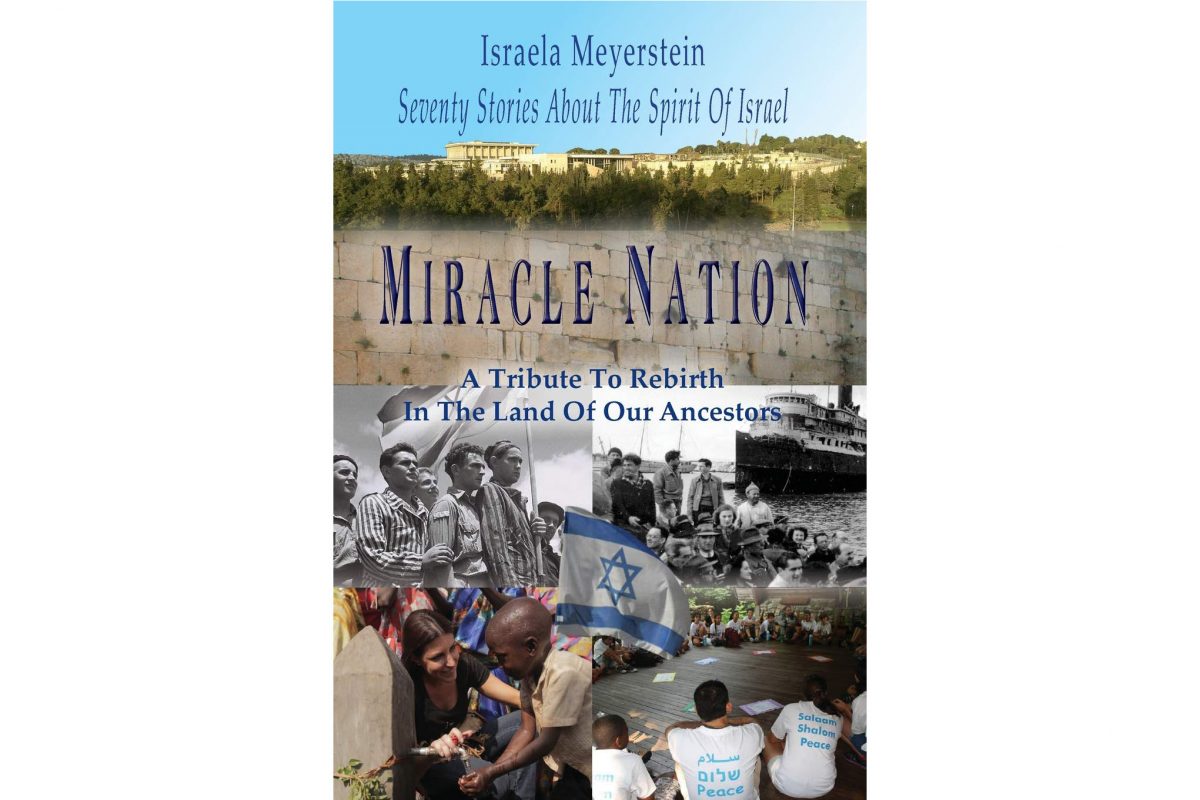Most of the news coming out of Israel these days tends to be negative, discouraging and less than flattering.
Israela Meyerstein wants to do her part to change that.
With this past year marking the 70th anniversary of Israel’s founding, Meyerstein, a psychotherapist based in Lutherville-Timonium, came out with a book offering true and uplifting stories about the Jewish state.
“Miracle Nation: A Tribute to Rebirth in the Land of Our Ancestors” (Mazo Publishers) comprises the experiences of 70 individuals who, in Meyerstein’s view, have helped Israel live up to the ideals on which it was conceived.

Meyerstein, 70, who lives in Pikesville with her husband, Rabbi P. Michael Meyerstein, has visited Israel approximately 20 times. She recently spoke with Jmore about her new book.
Jmore: How did “Miracle Nation” come about?
Meyerstein: About six years ago, I decided I was going [to visit Israel] each year and volunteer. About three years ago, I was thinking about all the different things and people I had been exposed to in Israel through volunteer projects.
On world forums and college campuses, all you hear is anti-Zionism and negativity. As a parent and grandparent, I had concerns about the younger generation. They didn’t go through the same life experiences as my generation, being the second generation after the Holocaust and watching Israel be frail. They don’t have the same existential sense about Israel.
I decided I would try to write about some of the wonderful tikkun olam [repair the world] work that is happening in Israel and being done by Israelis around the world.
How did you find these stories?
I had a few ideas for stories, both my own and my children’s, but after that, I started branching out. I structured the book as a quick trip through history, looking at what I felt were the major humanistic Jewish values — saving a life, protecting the earth, pursuing justice, compassion for the poor, the vulnerable and the stranger, inclusivity, and seeking peace.
Then, I decided I was going to go around, talk to people and find stories that illustrated those values. I just kind of [matched] the person and their work with the value. If they were willing to tell me the story, they were in the book.
What was the interview process?
In Baltimore, there were a couple of people who told stories, and I went to their houses and interviewed them. Many of the stories were sent via email. The [storyteller] would write a draft and show it to me. Some people didn’t feel up to writing their stories because of language [barriers], so they sent them in Hebrew and I translated them, elaborated on them and then showed it to them. So it was a very collaborative process. Sometimes, somebody had written or told a story before and then they gave me permission to use it.
Any particularly interesting stories?
Well, I have a good story about how I got a story, very serendipitously. Several years ago, I read an interview in an Israeli magazine with an [Israel Defense Forces] major general called “Cast Your Bread Upon the Waters.” He described witnessing from the Golan Heights the carnage of the Syrian civil war. Observing the many wounded civilians made him decide to do something to help save lives by opening a field hospital there.
I thought that it was so beautiful, the way he talked about “casting your bread upon the waters,” the idea of doing good for its own sake, not for a reward except for the mitzvah of saving lives. I very much wanted to write about it. However, I couldn’t locate him to get permission for his story.
Then, by chance, when I attended the local [Friends of the IDF] dinner, as I was talking to some people at the cocktail hour, suddenly I saw a name tag on someone’s suit jacket passing by — it was the retired major general! I recognized him from his picture. I quickly excused myself from the conversation and hightailed it over to him and introduced myself. I told him I’d been searching for him for months and asked if he would be willing to share his story. I was very elated when he said, “Sure.”
What do you want readers to take away from this book?
I want people to know about “humanitarian start-ups.” Israel has the most start-ups in the world next to Silicon Valley, but most people don’t know much about the humanitarian aspects of them, whether they’re medical or inventions. …
[The book’s purpose is to] highlight things that don’t appear in the press about Israel. To me, Israel, with all of its challenges and contradictions, is still a modern-day miracle with a caring, can-do and hopeful spirit that I admire.
Alex Holt is a Baltimore-based freelance writer.





